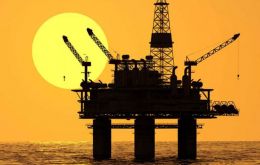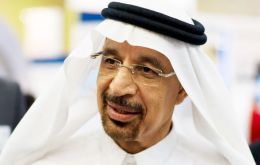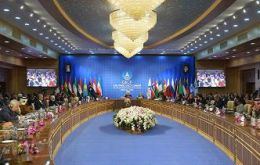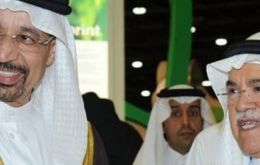MercoPress. South Atlantic News Agency
Tag: Khalid al-Falih
-
Thursday, October 4th 2018 - 07:04 UTC
Oil hits new high ahead of US sanctions on Iran supply, and despite Russia and Saudi higher production

Brent crude rose nearly 2% after hitting a four-year high on Wednesday as the market focused on upcoming U.S. sanctions on Iran while shrugging off the year’s largest weekly build in U.S. crude stockpiles and reports of higher Saudi Arabian and Russian production.
-
Tuesday, June 26th 2018 - 08:40 UTC
Saudis commitment to increase oil production to meet growing customer demand

Saudi Arabia’s state oil giant will meet customer demand for its crude after the country’s energy minister cemented a deal to boost global supply, according to Saudi Aramco CEO Amin Nasser.
-
Monday, November 6th 2017 - 08:07 UTC
Wall Street and LSE battle to host largest share floatation in history: US$ 100bn of Saudi Arabia's Aramco

President Donald Trump has made a pitch to Saudi Arabia to float the world's biggest oil company in the US. “Would very much appreciate Saudi Arabia doing their IPO of Aramco with the New York Stock Exchange. Important to the United States!”, twitted the US president.
-
Wednesday, September 28th 2016 - 12:26 UTC
Iran-Saudi Arabia can't agree on limiting oil supply: “maybe in November”

Iran rejected on Tuesday an offer from Saudi Arabia to limit its oil output in exchange for Riyadh cutting supply, dashing market hopes the two major OPEC producers would find a compromise this week to help ease a global glut of crude.
-
Saturday, June 4th 2016 - 09:29 UTC
OPEC summit fails to agree on a clear oil policy output strategy

The Organization of the Petroleum Exporting Countries failed to agree on a clear oil-output strategy on Thursday as Iran insisted on steeply raising its production, though archrival Saudi Arabia promised not to flood the market and sought to mend fences within the organization.
-
Monday, May 23rd 2016 - 11:28 UTC
What does the next OPEC meeting have in store?

The next OPEC meeting on the 2nd of June will act as little more than a forum for continued altercations between Saudi Arabia and Iran. The 2 June 2016 OPEC meeting will be held amid a backdrop of oil prices near $50 per barrel, a sharp drop in Nigerian production due to sabotage, turmoil in Venezuela, Saudi Arabia operating with a new oil minister, and Iran aggressively pumping close to pre-sanction levels.
-
Wednesday, May 11th 2016 - 12:14 UTC
Oil markets on alert: major overhaul in Saudi Arabia´s cabinet and economic policy

Saudi Arabia's King Salman removed the country's veteran oil minister as part of a broad government overhaul. Ali al-Naimi has been replaced after more than 20 years in the role by former health minister Khaled al-Falih.
-
Tuesday, March 1st 2011 - 06:20 UTC
Oil prices fall slightly Monday as Saudis confirm they are covering Libyan gap

Oil prices fell on Monday in ‘choppy’ trading as expectations that increased production from Saudi Arabia can offset supply disruptions in the region allowed investors to pause after Libya's turmoil sent prices to two and half year peaks last week.
